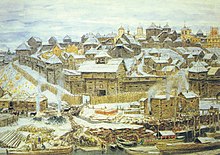



Moskal[a] is a designation used for the residents of the Grand Duchy of Moscow from the 12th to the 15th centuries.[1]
It is now sometimes used in Belarus, Ukraine, and Poland, but also in Romania, as an ethnic slur for Russians.[2][3][4] The term is generally considered to be derogatory or condescending and reciprocal to the Russian term khokhol for Ukrainians.[5] Another ethnic slur for Russians is kacap in Polish, or katsap (кацап) in Ukrainian.
Initially, as early as the 12th century, moskal referred to the residents of Muscovy, the word literally translating as "Muscovite" (differentiating the residents of the Grand Duchy of Moscow from other East Slavs such as people from White Ruthenia (Belarusians), Red Ruthenia (Ukrainians), and others). With time, the word became an archaism in all the East Slavic languages, and survived only as a family name in each of those languages—see below.[6]
The negative connotation in Ukraine came in around the late 18th-early 19th centuries in the form of an ethnic slur labelling all Russians. At that time, since the 1654 Pereiaslav Agreement of Cossacks with Moscow the majority of Russians in Ukrainian lands were soldiers of the Imperial Russian Army (and in fact at that time the term "moskal" was synonymous with the word "soldier"), as well as Russian bureaucrats, Russian nobles that were granted estates there, and merchants. All these categories were disliked by the locals.[7]
The "Moskal" is a stock character of the traditional Ukrainian puppet theatre form, vertep.[8][9]
It also gave rise to a number of East Slavic family names: Moskal, Moskalyov, Moskalenko, Moskalik, Moskalyuk, Moskalchuk, Moskalyonok.
{{cite book}}: CS1 maint: location missing publisher (link)
{{cite book}}: CS1 maint: location missing publisher (link)